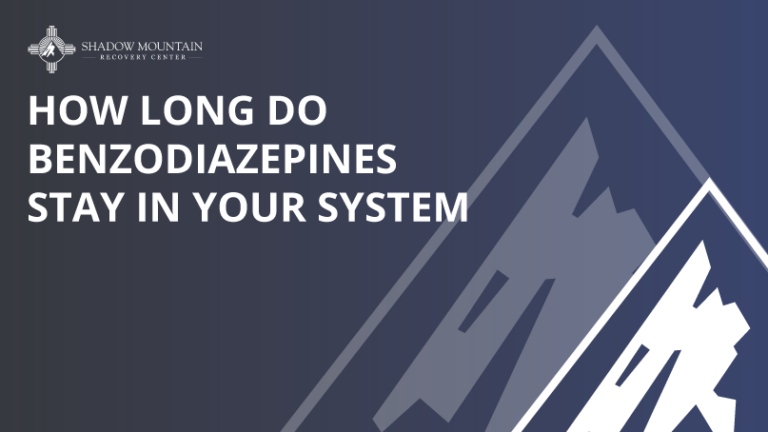Benzo Withdrawals
Benzodiazepines are a versatile medication that can help with a few different conditions. They’re primarily used to assist those who are managing anxiety, sleep disorders, and seizure disorders, but they can also be used to assist people going through alcohol withdrawal and recovery. Unfortunately, they are known for their generally short half-life, which is how long benzos stay in your system. Because of this, withdrawals are common, sometimes even for those using benzos as prescribed.
So what are benzo withdrawals? How do they happen and how “bad” are they? At Shadow Mountain Recovery, we believe in being transparent and educational when it comes to substance use. This can both help lower the stigma around addiction while providing our clients with the information they need to make informed decisions about their health. So let’s dive in and talk some more about benzodiazepines and withdrawal.
What is Benzodiazepine Withdrawal?
Withdrawal occurs when the body is used to a substance being within it and the substance is no longer there. The half-life of benzos can directly affect how severe or quickly someone might experience withdrawal. Not everyone who takes benzodiazepines will experience withdrawal, but your odds increase the longer you’re taking the substance.
What Causes Benzodiazepine Withdrawal?
Benzodiazepines primarily have two types: long-acting and short-acting. The less time that a benzo is within the body, the less time your body has to adjust to it no longer being there. Because of this, short-acting benzodiazepines can have higher withdrawal rates.
Valium is a commonly known long-acting benzo. The half-life for long-acting benzodiazepines can be as long as 5 days, meaning it takes 10 full days for the body to fully process the substance. This gives your body plenty of time to adjust to the substance leaving it. Benzos like Xanax, however, are short-acting and can have a half-life as low as 5 hours in some situations. This means the substance enters your body, starts working, and leaves the body within 10 hours. This quick turnaround time can lead to a higher chance of experiencing withdrawal.
Is Benzodiazepine Withdrawal Dangerous?
Withdrawal symptoms are normally annoying at minimum, to potentially life-threatening at their worst. Most benzodiazepine withdrawal symptoms are not life-threatening, but that doesn’t mean they aren’t dangerous. Experiencing withdrawal can lead to people choosing to continue taking a substance, or even taking it more than prescribed in order to reduce symptoms. This can lead to a cycle of consumption that won’t make the withdrawal any easier in the future.
What Are the Symptoms of Benzodiazepine Withdrawal?
If you are taking benzodiazepines to assist with anxiety, sleep disorders, or seizures, suddenly stopping benzos can lead to worsening of the symptoms you were trying to manage. This is due to the body being used to the help benzos were providing, and suddenly halting use can make your body react negatively.
Benzodiazepines are a depressant, which means they primarily impact the central nervous system, slowing it down. This doesn’t mean, however, that you won’t feel side effects in other parts of your body and brain during withdrawal. Let’s break this down into two different categories: mental health-related symptoms, and physical symptoms.
Mental Health Withdrawal Symptoms
One of the main reasons benzos are prescribed is to assist those who are managing panic attacks. Despite this, one of the symptoms you might experience during withdrawal is panic attacks. This isn’t the only impact it might have on your mental health, however. Here are just a few more of the symptoms you might experience:
- Depression
- Anxiety
- Panic Attacks
- Agoraphobia
- Nightmares
- Paranoia
- Delusions
- Depersonalisation
- Derealization
- Hallucinations
Benzodiazepine Withdrawal Symptoms That Affect the Body
Benzo withdrawals can also come with a myriad of physical symptoms. Here are some you might experience:
- Cramps
- Blurred vision
- Dizziness
- Headaches
- Increased sensitivity to things such as light, sound, touch, and smell
- Loss of appetite
- Nausea
- Restlessness
- Sore eyes or tongue
- Ringing in your ears
- Vomiting
- Weight loss
- Tingling sensations on your hands or feet
- Burning sensations on your skin
- Memory loss
- Muscle twitchings
- Seizures
If you start experiencing any of the symptoms we’ve mentioned so far, you don’t have to manage them alone. Going through a benzo detox program, like the ones we offer here at Shadow Mountain, can not only help alleviate some of these symptoms but put you in an environment of healing to help make recovery easier.
Timeline for Benzodiazepine Withdrawal
The withdrawal period for benzodiazepines can vary depending on what kind of benzos you were taking. For short-acting benzos, withdrawal can start within several hours of your last dose. For long-acting benzos, you might not start experiencing withdrawal until up to three weeks after your last dose.
There are a few things that can impact the severity of your withdrawal. The longer you’ve been taking benzodiazepines, the more likely you are to experience withdrawal. This also increases your risk for the severity of your symptoms as well. Even those who are prescribed benzodiazepines can experience withdrawal. This is why many doctors will do their best to taper dosages to help wean a person off benzodiazepines. This can lower the chance of withdrawal occurring, or at least lessen the severity of your symptoms.
During your withdrawal period, symptoms might start off being manageable and slowly get worse the longer it’s been since your last dosage. Depending on the type of benzodiazepines you were taking, your symptoms might not start showing up for a while. Once they do, the first 1-4 days of symptoms are normally mild.
After these first four days, many people then go into a more intense, full-blown withdrawal period that can last up to 14 days. Once this time frame is up, many people will see a decrease in symptoms. Some people, however, might continue to see symptoms like anxiety or depression even after this. These symptoms can be alleviated by proper treatment.
Get Treatment for Benzodiazepine Addiction
Stopping the use of benzodiazepines isn’t an easy process. Withdrawal symptoms can be aggravating to even potentially life-threatening. This is where a treatment center, like Shadow Mountain Recovery, can help. We offer benzo treatment options for every step of the process, from detox to outpatient and beyond. We believe in the power of helping you find the right path that will fit your specific healing goals.
During detox, our staff will help you manage and alleviate withdrawal symptoms so you’re able to focus on your recovery instead of having to focus on your side effects. From there, we will work with you to determine what steps will be best next – inpatient or outpatient treatment.
Inpatient treatment allows you to stay on-site at one of our facilities. This gives you the ability to focus solely on your recovery while being surrounded by others who are doing the same. We offer a variety of evidence-based programs to help you along the way.
Our outpatient program still reaps many of the same benefits as inpatient, while allowing you to go home at night. This works especially well for those trying to maintain employment or be with their families during recovery.
If you or a loved one have any questions or are looking to get started on the road to recovery, don’t hesitate to give us a call today at 855-596-0196.






